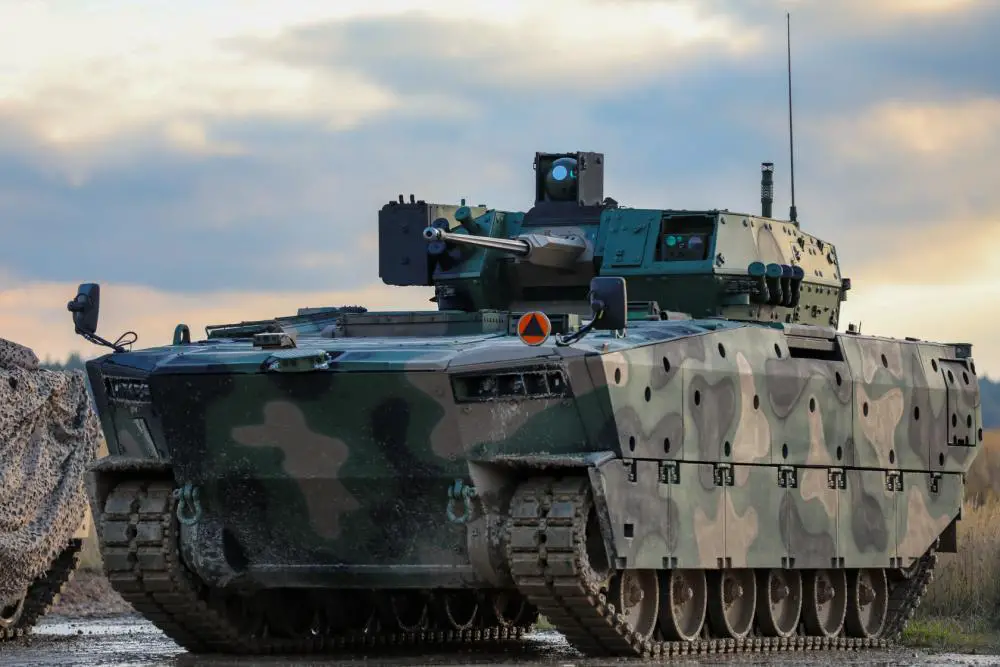The NATO enhanced Forward Presence Battle Group Poland consisting of the 3rd Battalion, 8th Cavalry Regiment, 3rd Armored Brigade Combat Team, 1st Cavalry Division (3-1 ABCT) operationally controlled by the 1st Infantry Division (1 ID), Polish Armed Forces 15th Mechanized Infantry Brigade, The Royal Lancers, Prince of Whales Troop, Romanian Sky Guardians, and Croatian army Archer Battery were joined by Mariusz Blaszczak, Poland Deputy Prime Minister, Minister of National Defense in the unveiling of the Borsuk (Badger), the new Polish Infantry Fighting Vehicle (IFV) in Bemowo Piskie, Poland, Nov. 14, 2022. The Polish Badger IFV is designed to replace the older Soviet model BWP-1 IFV previously used by the Polish armed forces. The modernization of an army’s equipment, vehicles and arsenal is essential to maintaining combat readiness, versatility and utility.
“Both our armies are currently prioritizing modernization efforts in order to meet the adversarial threats around the world. In order to meet the challenges associated with those threats, modernizing and upgrading our fighting power is the key to war fighting mastery. Interoperability sometimes means technical solutions, understanding of doctrine and tactics, but it always definitively involves a human element. That’s what is very important to me, is that my Soldier’s train with Polish armed forces and alongside our NATO allies, as much as possible, because that is what is at the core of interoperability,” said U.S. Army Lt. Col. Sean M. Castilla, commander of NATO enhanced Forward Presence Battle Group Poland and the commander of 3rd Battalion, 8th Cavalry Regiment (3-8 CAV), 3rd Armored Brigade Combat Team, 1st Cavalry Division (3-1 ABCT), operationally controlled by the 1st Infantry Division (1 ID).

“The needs of the Polish army are very large, and one of the important elements of this process is the replacement of worn-out armored fighting vehicles with new vehicles. We are constantly modernizing the equipment of the Polish army. We want this equipment to be interoperable with the equipment of NATO allies, we are prepared for the process of strengthening the Polish armed forces to be very dynamic. The fact that these vehicles are interoperable with the equipment of our allies, hence, it is no coincidence that next to the Borsuk armored fighting vehicle stands the American Bradley,” said Mariusz B?aszczak, Poland Deputy Prime Minister, Minister of National Defense.
“As a scout out in the field, being confident in knowing that we can get the help on the battlefield when we need fast support and firepower, we need that back up,” said Staff Sgt. Devonte T. Bass, cavalry scout and tank commander for Headquarters and Headquarters Company, 3-8 CAV, 3-1 ABCT. “Seeing what the Badger can do, through the vehicle’s capabilities and firepower, is what we need for backup on the battlefield.”
The Badger will replace the BMP-1 IFV with improved versatility, modernized armor and weaponry, which will improve support for mechanized dismounted soldiers on the battlefield. Modernizing versatile IFVs, like the Badger, offer critical opportunities to improve a mechanized ready force. Operationally, in conjunction with dismounted soldiers on the battlefield, it improves the combined capabilities of unified member nations of the NATO Battle Group Poland alliance. The interoperability of war fighting units from differing nations brings about complexities. However, training familiarity with equipment, tactics, assets, and engagement activities enables critical synchronization and cohesion for U.S. and allied partners of the eFP Battle Group Poland to react rapidly and overcome threats to the stability of the region. From mechanized units conducting maneuvers on training ranges to dismounted infantry soldiers, to reconnaissance elements conducting scouting training missions, multi-national training between allied nations forms the framework for a strong deterrence and defensive posture for Poland and the NATO Alliance.
















